“Portland’s transportation advocacy ecosystem has never been stronger. What we’re missing is leadership from city hall.”
Publisher’s note: While we’ve made a lot of noise in the past month about the need for immediate street changes to reflect new behaviors, another big part of this conversation is how best to transition our streets when quarantine is lifted. Kiel Johnson, a BikePortland contributor and owner of Go By Bike Shop & Valet under the Aerial Tram, reflects on that issue in his letter below.
Dear Commissioner Eudaly,
We cannot afford to go back to the way things were before this global pandemic. As we begin planning how our city will operate once the stay at home order is lifted, we must make big changes. We must rebuild a resilient society where social capital is available to everyone.
One of the best ways to provide universal access to social capital is in how we design our cities. People-focused designs are like an ATM where anyone can collect a social capital check. This is especially important when the real checks stop coming.
What the experts and thinkers have been telling us is that relying so much on private automobiles does not leave enough space for the creation of social capital and the byproducts of cars are killing ourselves and our planet.
Commissioner Eudaly, you are an activist and to create change PBOT needs to lean on the energy and connections that Portland activists have been building over the past decade. Catie Gould from Bike Loud PDX is one of the most articulate and passionate young transportation reformers we have seen in a long time. Jillian Detweiler has turned The Street Trust into a thoughtful and diverse organization ready to engage at the local level. BikePortland is a powerful loudspeaker that is able to inform and inspire. Pedalpalooza event organizers have brought to reality many inspirational and innovative ideas.
Portland’s transportation advocacy ecosystem has never been stronger. What we’re missing is leadership from city hall.
Advertisement
“Could we roll out a temporary version of the complete 2030 Bike Plan this summer? Can we transform PBOT to do the work of Better Block on a citywide scale?”
City leaders in places like Oakland have shown how the government can work quickly. Paris’s mayor, Anne Hidalgo, has shown how to unite a city to move away from private automobiles. Car ownership in Paris has dropped in half since 2001. In Vancouver BC, city leaders have doubled bike ridership in five years to 12% of all trips.
I remember the first time we met. Myself and several other transportation advocates were sitting outside council chambers preparing to testify when you came over and told us you “were one of us” before entering the chamber. Afterwards, we were all star-struck and very encouraged by your words of solidarity.
Right now we need city leaders who can unite people around a vision of what the post-coronavirus city looks like. Listen to your most visionary planners at PBOT and ask advocates to help the city engage and build that vision. Could we roll out a temporary version of the complete 2030 Bike Plan this summer? Can we transform PBOT to do the work of Better Block on a citywide scale?
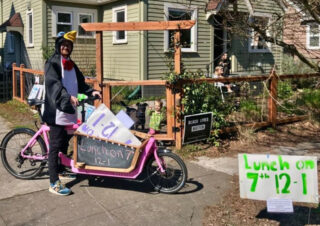
Right now we need government to work better than it ever has. We need to try big, bold, new ideas and not be afraid to adapt them as conditions change. We need to work closely with the most vulnerable people in our communities and make sure changes elevate and fulfill their needs. Most importantly, we need the government and our elected leaders to act.
This crisis has created hardship on everyone in our society, especially those who have been most exploited by our system. When we return, if we do not do things to reduce that exploitation and create a government that works better, we will have failed. We need to fill up that social capital ATM and make sure everyone has the PIN number.
If we have strong leadership and vision and work together, we can create a more sustainable movement that makes us more resilient for the next crisis. That is a legacy worth fighting for.
Sincerely,
Kiel Johnson – Bike train conductor, bike valet parker, yard sign designer, and since the pandemic, guy wearing penguin costume riding a sound system bike everyday during lunch in my neighborhood on NE 7th Avenue.
— Get our headlines delivered to your inbox.
— Support this independent community media outlet with a one-time contribution or monthly subscription.



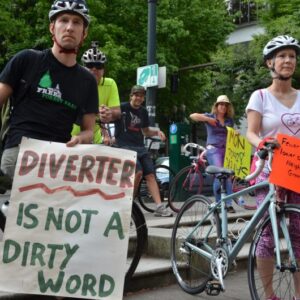
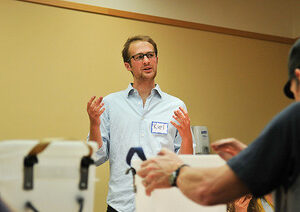
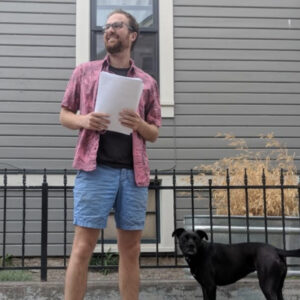
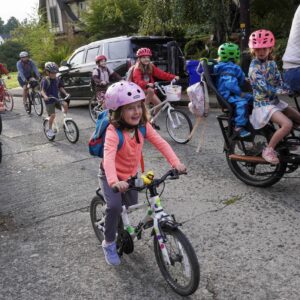
Thanks for reading.
BikePortland has served this community with independent community journalism since 2005. We rely on subscriptions from readers like you to survive. Your financial support is vital in keeping this valuable resource alive and well.
Please subscribe today to strengthen and expand our work.
Kiel for Council!
139 IQ is now apparently obsolete cuz wtf is this nonsense ?
i have sent multiple requests to Multnomah County Animal Services to remove the smeared goose carcass that is in Better Naito under the Morrison Bridge.
Guess what???
weeks later, that carcass is still there!!
SO GROSS, especially when it rains.
pretty sure the City depts, bureaus, etc are using this whole “shutdown” as an excuse to do NOTHING. and then more NOTHING.
I like this letter, and agree that we need to seize this opportunity. I fear it will fall on deaf ears.
Claims of being “one of us” notwithstanding, Eudaly has never demonstrated any particular support for taming auto use in Portland, and has rejected even low-stakes opportunities such as putting out traffic cones to create temporary bike facilities on covid-emptied streets or closing greenways to non-local vehicular traffic.
I hope Eudaly surprises me, but I’d be surprised if she did.
Activism is easy – it’s not hard to appeal to the ears of like-minded individuals.
Administration is much harder – you have to meet the needs of everyone as best you can.
Activism is easy? This is news to me.
Try implementing policies activists are against, but still serve the greater population. It’s easy to be “for” something. It’s much tougher to put it into production.
Posting on a message board is not activism. Activism is a LOT more work.
You’re confusing administration with politics.
Eudaly CAN do something right now, but fears the political backlash.
Politicians usually don’t do what’s right unless they get a lot of approval for it. If the general public that elected you wants to continue polluting and killing then you let them.
She doesn’t want to be back on her own wondering if she’ll make rent each month. Much easier to state that our ideas are unpopular and continue with the horrible situation we’re in.
Eudaly is in serious trouble, politically. She made the fatal mistake of taking on the neighborhood associations, and now she has an energized and activated network working hard to defeat her in the upcoming election. I’m guessing she is aware of the forces arrayed against her and doesn’t want to do anything to jeopardize her slim chances of re-election.
It’s possible to have your heart in the right place but be bad a politics, and Eudaly is as bad at politics as anyone I have ever seen. It’s a real shame.
yes yes yes!!
Love this so much.
From what I hear, many of the staff at PBOT are very enthusiastic about building protected bike lanes and car-free streets—they just need the go-ahead from leaders (who seem to still be afraid of the NIMBY vocal minority).
You’ll never please everyone, but I think many people oppose change because they don’t know what the consequences are, and they fear the worst. Usually the worst doesn’t materialize.
PBOT could address this on some projects (like a diverter) by installing them temporarily before the public process starts, and, after a fixed time period, removing them. Then doing their public outreach.
The trial period will give everyone a realistic view of what’s going to happen, so people aren’t operating out of fear of the unknown, and PBOT can see what’s working and what needs adjustment. It’s important that PBOT actually go through the removal stage so everyone understands it’s not an attempt to bypass public participation, and this will lessen opposition to future temporary installations.
All true.
I’d also add that some people oppose change because they are not getting everything they wanted.
Or they feel like we should be getting more than what we do with our current taxes…
I agree with the importance of building social capital, but an even more important reason to build alternatives to automobiles is economic. Despite most peoples best wishes ,the post Covid world will not be the same. This pandemic has happened at the very end of a 40 year debt/credit super cycle. This era of providing prosperity by substituting growing, private, corporate and public debt for stagnant wages was coming to an end and the “Rona” just brought the curtain down. When we come out of this we will have to learn to live with less and decreasing the ridiculous cost of the private automobile transportation system is one of the best ways to do that. Lets start the changes now while we still have some cash under the seat cushions.
Since we are on the topic, let’s talk about revenue.
What is being proposed here by Kiel (and Jonathan in earlier posts, as well as many others, myself included) is to vastly reduce the need for cars, encourage people to walk and bike more, and to continue to work from home even after a Covid-19 vaccine is successfully administered to everyone who wants it.
PBOT, like most entities in Oregon, gets most of its revenue from sources that a dependent on people driving gasoline-powered motor vehicles as much as possible (gas tax is based on the volume consumed, not miles driven), and parking them in or near downtown (parking rates), and of course continuing to own their cars (vehicle registration fees). If we create a community where people really don’t need a car, especially to go downtown to work, then PBOT’s revenues will vastly decline (and that decline has obviously already begun.)
Also we are in a recession, possibly even a depression. Unemployment is way up, even more people cannot afford the rents they are now paying, and homelessness was very high even before this crises.
So how are we proposing to pay for these improvements? Where is the revenue coming from? And where is the future revenue coming from if we are deliberately cutting off or reducing existing revenue sources, by making driving of inefficient gas-powered vehicles more difficult and making the use of non-revenue-generating alternatives much easier and more convenient?
Demand is changing traffic patterns on the street more effectively than any number of cones and stuff. Whole families on bikes, or on foot, are now a commonplace.
Time for the city to recognize the new 85% rule. Put diverters on greenways midway between collector streets.
… the 85% who obey the law and the 15% who drive like maniacs…
I just figured it was the fact that 85% of drivers violate they posted speed limit.
Those numbers are very much backwards.
Sadly it seems that the remaining cars on many of our roads are operated by those “15% who drive like maniacs”…
is the penguin suit in memory of Penguin Park on Rosa Parks? A tribute to that one time the zoo stored their penguins at Peninsula Park♥️
That sounds like a much better reason then “i got it on close out”.
From now on it is the Penguin Park costume!
FWIW I think Katie Gould should get an Alice award for showing up for the hard work of organizing, data mining and social media shero!
Sorry to be a stickler for detail, but what is the specific ask of the city in this open letter? If it’s temporarily rolling out the complete 2030 bike plan over the next few months, how exactly would that work? I’m often frustrated at the city’s pace when it comes to rolling out improvements, but a 10 year plan isn’t going to happen with the snap of a finger for both practical and political reasons, even with a lot of improvisation. The city and state are quickly going bankrupt and have a lot of competing priorities now and in the foreseeable future.
Clearly many, particularly those in truly crowded and polluted cities, have had a glimpse of a more idyllic urban landscape, and I’m hopeful it will leave a lasting impression and over time influence the small choices everyone make that ultimately shape how we live. But right now the vast majority of people need the world that was just a few weeks ago restored, and want their leaders to focus solely on that.
100% don’t see the ask..think this is what was meant above with “activism is easy”…saying we need to” try big, bold, new ideas”…and “work closely with the most vulnerable”…awesome..i’m in…but what does it mean?
It means getting tens of thousands of people out of their cars and diverting millions and billions of dollars to public transportation and an urban infrastructure conducive to people walking about. Hmm….
Honestly cant tell if u are serious or sarcastic…lets assume serious:
“Diverting millions and billions” – honestly tough hill to pick to die on here…trillions are being burned here…advocating for raw new expenditures impossible unless u have the power to sneak pork into a bill disguised as essent pandemic relief
“Getting tens of thousands” out of cars…maybe advocate for tax breaks for companies to shift to 2-3 day work weeks (incenting workers to work from home 2-3days a week and/or increase flexibility in job share…this is something that coupd fly in this environment as every workforce is being forced to figure out how to make these arrangements work. 2-3 day work weeks down from 5 wud certainly impact #of cars on road
Here’s a specific ask: turn existing greenways into effective people places by doubling the number of diverters. Use temporary markers that are available, perhaps empowering volunteers to fill in a spraypainted outline. Follow that up with permanent installations using curbs or planters.
Neighbors on NE 7th Avenue have shown the way by having a regular schedule of street parties. No doubt that program is in abeyance now, sigh, but the city has made it pretty easy to do in a normal time.
The ask is for leadership around repurposing space from private automobiles. The Rose Lane project is great but this is not the time for transit. It is really hard for advocates sitting on the outside to know what exactly to ask for (protected bikes lanes on Sandy?) when we do not know the resources and opportunities that PBOT has.
In my experience when advocates all work together with leadership from the city it is pretty easy. When we work against each other it is very difficult.
Speaking as a volunteer who served for 6 years on the PBOT Bureau/Budget Advisory Committee, is that technically you (and others) are asking that a majority of state-mandated transportation infrastructure funding that has already been committed to various infrastructure projects be diverted to another set of infrastructure projects, particularly those involving the bike master plan.
Aside from the enormous push-back you’ll get from PBOT engineering staff and leadership who’s continued employment is dependent on the current budget, PBOT has certain legal obligations to pay debts and to honor contracts with other agencies, most importantly with BES to clean and maintain sewers (about a third of the PBOT budget), with TriMet (Streetcar), and with ODOT. On top of that is the operational budget to pay for personnel, interagency contracts with other city agencies (HR, GIS, Printing, BPS, BDS, etc.)
As we discovered on the committee, the actual amount of infrastructure funding that can be diverted during a recession AND with the help of very strong political leadership (Mayor Sam Adams in 2012) is roughly about $16-$20 million out of PBOT’s annual $250 million budget (in 2012), which at that time we got the bureau to spend on sidewalks in SW and East Portland, by deferring bond payments on the Sellwood Bridge.
As far as taking money from the Rose Quarter project and using it towards bike infrastructure, I’m sorry but you are asking the wrong people. You should write to your governor and state legislators. Neither PBOT nor their commissioner nor indeed city council has any real say-so over that money.
DH-
from your vantage, how about my proposal above?
is it feasible for local and/or state govt to give incentives to local businesses to implement 2-3day work weeks (where remainder of traditional 5day work week are supplanted by work at home initiatives?)
*technically doesn’t impact existing expenditure commitments
*certainly would impact daily car commuting, and mite change some commute strategies
*benefits from chaotic momentum already established from pandemic (work at home strats)
its not the endgame of “get cars off our streets”, but it seems a parallel ask in that direction
The main incentives the city could offer to small businesses would be reduced property taxes, business license fees, and reduced regulation, non of which would have any impact on PBOT whatsoever, either positive nor negative, since PBOT doesn’t get much revenue from property taxes and license fees. PBOT would however take a big hit from the loss of downtown parking revenue and less gasoline sold from the reduced driving. TriMet would also take a big hit from reduced ridership.
The reality is that our common goal of reduced VMT (vehicle miles traveled) will have a huge negative impact on transportation revenue which needs to be made up some other way. Ultimately we all have to pay for the infrastructure we use, want to see improved, and want to see maintained. Relying on the Feds who are already broke ain’t gonna work – everyone else nationwide wants more handouts. And tourism taxes don’t work if you don’t have tourists.
It’s depressing, DH, but I think you’ve done a useful service here, in helping us see the yawning gap between “We are the world” rhetoric and the gritty forces upholding the status quo.
I rode to the grocery store in Beaverton yesterday, and the traffic was almost as heavy as on a “normal” Friday. As soon as businesses and schools re-open, traffic will be heavier than ever – sorry to say.
Yeah, we have the same here in suburban NC, sigh… Everyone who is wearing a mask is hugging one another, everyone else is standing 1-3 feet away, back to ‘business as usual’, except the bars and restaurants are still closed. More traffic than ever. The WHO warned that ordering everyone to wear a mask would give everyone a false sense of security, and now here we are. Our local hospital freely admits it doesn’t have the new 5-minute testing kits yet, it still takes 6-9 days for results, and so they are only testing front-line workers, but not sick patients, so no one here knows how many people are actually sick with the virus. Our last count was a week ago, 143 cases and 10 deaths, in a county of over 500,000.
David Hampsten, I noticed you said Rose Quarter, while Kiel said Rose Lane. Two quite different projects.
But since you bring up Rose Quarter & reallocating its funding… for more than a year I’ve been asking various jurisdictions & officials to prioritize high crash orphaned highways like TV Hwy, instead of funding Metro area systemic freeway expansion. Meanwhile, Hillsboro police tweeted that another person was hurt walking across TV Hwy last week. While my Metro rep has championed coming to the aid of people living (and dying) with TV Highway, he hopes to do that through the Metro tax. He recently explained he sees the Rose Quarter project as a community redevelopment project rooted in racial and restorative justice.
But if restorative justice is worthwhile to us & our leaders, can’t they make that happen *without* the freeway expansion part? I started asking that in January, with no answer. How has justice become inextricably linked with expanding the thing that caused injustice in the first place?
In a way, I have no alternative but to trust my rep—no other elected official has expressed a deeper understanding of people’s desperation to resolve TV Hwy’s deadliness than he has. While it’s exciting that Rose Quarter neighborhoods could be healed & thrive, inducing more driving to & past the Moda Center will also continue to marginalize & harm neighborhoods seated along TV Highway—especially if the Metro transportation bond fails. All this to say, I think Portland city council *should* be taking the justice of perpetuating Metro-wide systemic car use into consideration, regardless of their control over our state’s HB2017 money & how equitably it’s being spent. Some officials out west have even said they think TV Hwy should be freeway. Imagine this whole cycle repeating.
IMO, campaigning with your state legislator for better orphan highway funding is the best and most efficient use of your advocacy efforts, so way to go!
Restorative justice only works if the victims of injustice are there to receive the benefits of justice. My understanding is the historically black community in Albina is long gone in most of the neighborhoods, largely replaced (or involuntarily displaced through higher rents) by wealthier people of mixed races, whites, Asians, Latinx, etc, at least according to the Census. While Harriet Tubman middle school is named for an historic black hero, most of the ‘minority’ students there are not African-American, in fact very few are, so I’d say this is one of those all-too-frequent cases of the wealthy using the historic black community to get their way, without the selfsame black community getting any benefit. I suspect that ODOT already sees through all this, and clearly neither your governor nor your state legislature cares about it.
The neighborhood as a place wasn’t wronged, even if people who lived there were. It seems the best way to compensate those who deserve compensation is to find them, calculate what they are owed, and pay them. Improving their former neighborhood may make the city nicer, but the direct benefits accrue to a different group of people.
Looking back at the pictures of the planned Rose Quarter paving project, I have to ask, how are these spaces meant to restore anything or do justice to anybody not in a car, anybody real as opposed to a computer generated line drawing of a person and a little dog?
We are supposed to replace a fragmented street grid with a different arrangement that has a new set of problems. We are to get new public spaces, the decks over the freeway, that won’t support development. Who thinks those spaces will be adopted by the community? What’s meant to happen there?
Metro should claw back the recent $100 million+ funding for the Rose Quarter debacle. Find a way to spend that money in East Portland or in any other place where real people and their living children are being crushed in the name of ‘Level of Service’. Jobs are jobs, and a person can be well paid for fixing sidewalks.
Yes, Hello, Kitty, that way of compensation also makes sense. I’ve read how Legacy Emanuel at least apologized; this article discusses that . The author praises the apology, but criticizes the City of Portland, saying Portland City Council has made plans it’s apt to ignore, even obfuscate. Here, as the best journalists do, the author makes a concept too often left abstract, concrete: “In a 2003 interview, Knauls told me he was never compensated for the loss of Paul’s Cocktails, which sat at 19 N Russell.”
To that, David Hampsten, when you say it’s “the wealthy using the historic black community to get their way,” which players, exactly, are “the wealthy”? ODOT & contractors? Signatories of that March 27 letter to the OTC, reported by the Oregonian as “opponents offer olive branch”? Silent partners on boards unnamed in the EA? Of course, how a silent partner would be accounted for in a public project I don’t know. That gives it the air of a quid pro quo.
Same with the Metro transportation bond, really. Metro puts me in a double bind if the same tax that’d help restore TV Hwy also funds miles of new fossil fuel infrastructure on Airport Way to Port of Portland’s new $265M car parking. We can speak in abstractions, but visiting the miles of TV Hwy between Beaverton & Hillsboro—on foot if possible—is better. Beyond the daily stress of being dependent on a bicycle or feet & the bus along there, imagine more people displaced to turn their “main street” into a freeway—or forced to live next door to one.
That March 27th letter to OTC & Chair Van Brocklin does say: “ODOT should reaffirm the scope of the project and commit to a complete project that reflects local, regional and community priorities while meeting the needs of the state system.” But forget, for a moment, negative mobility justice implications for friends living on TV Hwy west of the expanded freeway system. What if the elected officials we trust most are correct in assessing that the I-5 Rose Quarter project would result in racial & restorative justice? Wouldn’t that make it wrong to fight the project? (Granted, for now that concept feels mired in project abstractions, discussed in phrases like “new standard” & “environmental outcomes” & “project impact.”) Still, isn’t that March 27 letter really written to us as the public stakeholders—& often freeway fighters—signaling us to trust the forthcoming “partner agency agreement,” assuming it is formed?
You know, I don’t ride a bike I haven’t in a while, I have a dog and I regularly walk her. One thing I am considering … How it would be if I was to give up my car. I would like to know from people who have done that how they have weathered the experience. I would like to know what they’ve gained and what was difficult.
A bicycle frees one from dependency on externalized infrastructure to whatever degree the persons evolutionary state allows. The work of Illich. As to bicycle free “anti car” living. . .
Train your body to walk a solid 6 in under two hours or youre wiser to learn to maintain a cheap beater car where it rains. Riding busses and public trains for decades is a devolutionary mistake to a realized human being. A glaring example of unconsciously replicated biomass squeezed into breeding coops illustrated this well, then it appears this civilization,
Amused itself to death
If you haven’t already, check out Becky Jo’s columns on this blog. She and her family made an abrupt change to being car free, and it sounds like she’s managing the change very well.
https://bikeportland.org/author/beckyjo
The kicker, she had to because of financial reasons. When you have to, you have to manage well, or every day is a challenge. I was car free for six years because of financial reasons. I loved that time of my life, granted I was in my mid twenties, worked at a bike factory, lived with roommates that loved bikes, had no dependents and dated women that also enjoyed my lifestyle. So, if you have a “cultural support network” that promotes bike free life, then it can be amazing!
Excuse me, car free life. These days I feel like I’m bike free, but I want to get back.